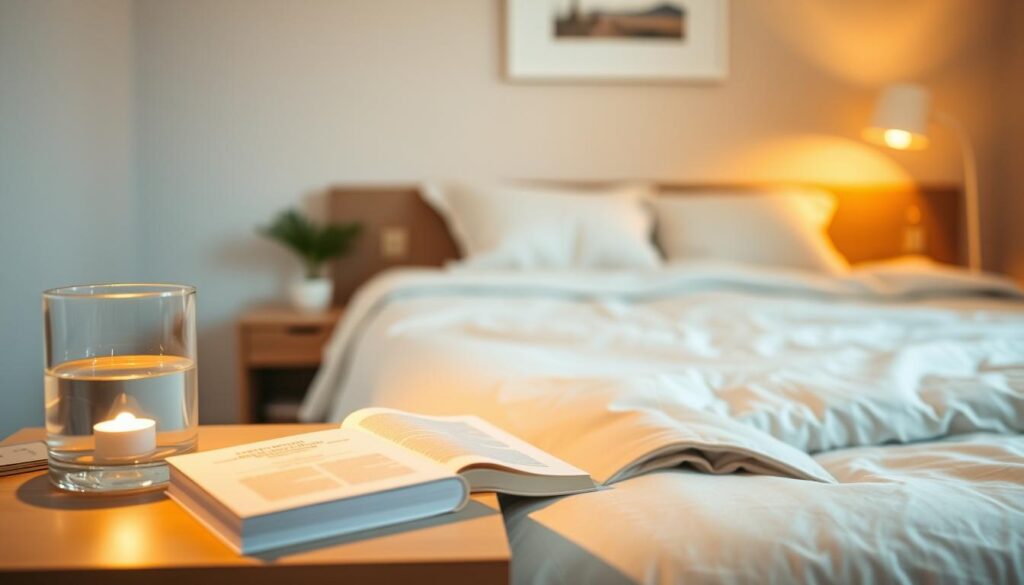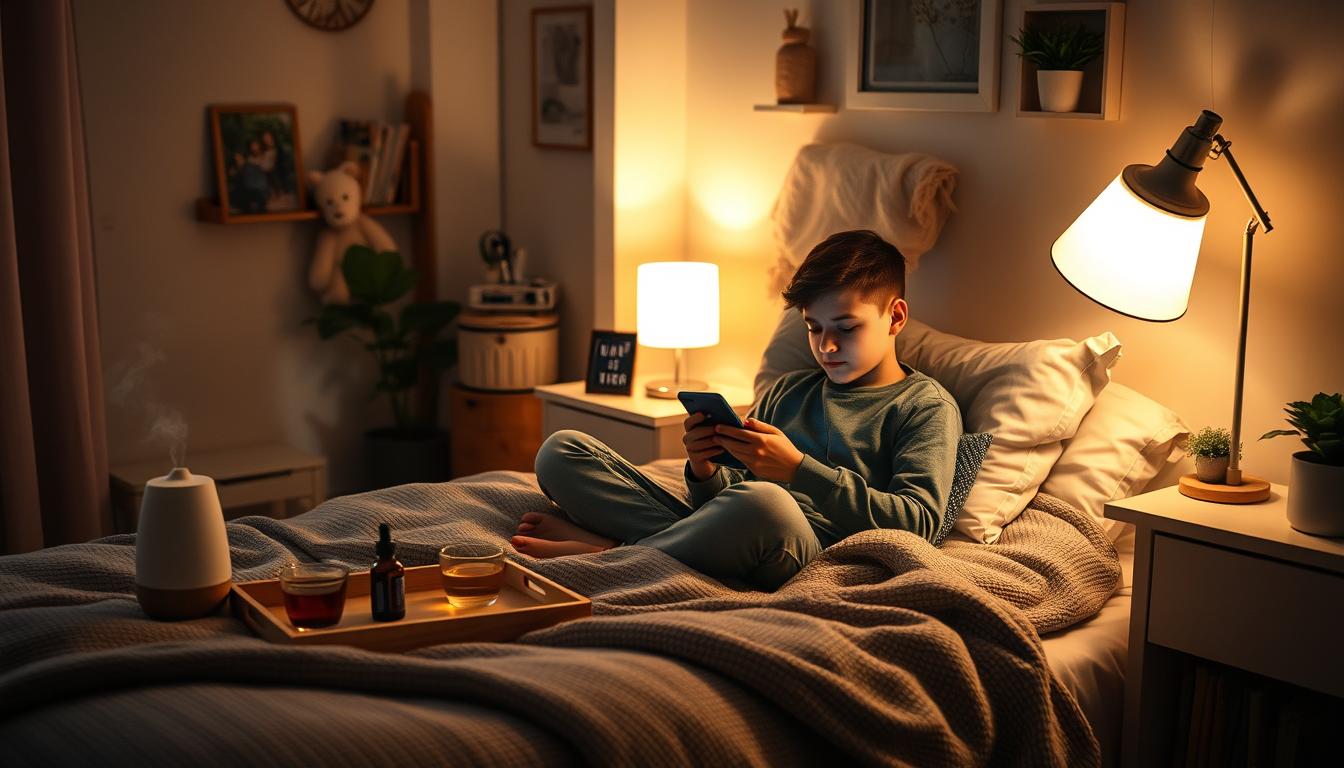Teens today face busy schedules, school stress, and late-night screens—all disrupting sleep. Quality rest is vital for their health, focus, and growth. This guide explores the best sleep aids for teenagers, focusing on safe, natural solutions to improve sleep without harsh chemicals.
Poor sleep affects grades, mood, and energy. Discover gentle methods like herbal teas, calming routines, and proven supplements. We’ll cover science-backed options to help teens reset their sleep cycles and wake up refreshed.
Key Takeaways
- Quality sleep boosts academic performance and emotional well-being.
- Natural sleep aids offer safer alternatives to prescription medications.
- Consistent routines and environment adjustments matter as much as supplements.
- Choosing the best sleep aids for teenagers requires understanding individual needs.
- Small changes today can lead to long-term improvements in sleep health.
Understanding Teen Sleep Patterns and Challenges
Teens today face unique obstacles to getting enough rest. Biological changes during puberty shift sleep cycles, making it harder to fall asleep early. Add school demands, after-school activities, and endless screens, and it’s no surprise many struggle. Sleep supplements for teens are one solution, but first, let’s explore the root causes.
Common Sleep Issues Among Teens
- Delayed sleep phase syndrome: Teens naturally feel alert late at night.
- School start times clash with their body’s rhythms.
- Social media use before bed disrupts melatonin production.
Impact of Sleep Deprivation on Adolescents
Lack of sleep harms more than just mood. Grades suffer as focus fades. Studies show teens who sleep less than 8 hours nightly are more prone to anxiety and weight gain. Physical growth and brain development also depend on quality rest. Sleep supplements for teens might help, but addressing these issues starts with understanding their daily routines.
The Science Behind Natural Sleep Aids
Natural remedies for teenage sleep problems often work by supporting the body’s natural sleep signals. Scientists study how certain ingredients interact with brain chemistry to improve rest.
How Natural Ingredients Influence Sleep
Key ingredients found in sleep aids affect the body in specific ways:
- Melatonin: A hormone that syncs the body’s internal clock with day-night cycles.
- Chamomile: Contains compounds that calm the nervous system, reducing anxiety.
- Lavender: Essential oils lower cortisol, the stress hormone, promoting relaxation.
Recent Research Findings
Studies highlight promising results:
| Study | Focus | Outcome |
|---|---|---|
| 2023 UCLA Sleep Study | Lavender aromatherapy effects | Participants fell asleep 12 minutes faster on average. |
| 2022 Johns Hopkins Research | Melatonin dosage safety | Low doses (0.5–1 mg) improved sleep without side effects in 78% of cases. |
These findings show how natural options can address teenage sleep problems safely. Future sections will compare top products and explain how to use them effectively.
Benefits of Natural Sleep Aids for Teenagers
Natural sleep aids offer teens a gentle path to better rest without the risks of harsh chemicals. These options like chamomile tea or valerian root work with the body’s natural rhythms to promote deeper sleep cycles. Teens using these methods often report waking up more refreshed and alert during the day.
| Benefit | Impact |
|---|---|
| Reduced Anxiety | Herbal supplements like lavender calm the mind before bed. |
| Improved Focus | Consistent use correlates with better school performance and mood stability. |
| Cost-Effective | Many remedies like warm milk or magnesium supplements are affordable and accessible. |
Natural options avoid the dependency risks of prescription drugs. Parents and teens prefer solutions that align with healthy lifestyles. For example, a 2022 study in the Journal of Adolescent Health found melatonin use in moderate doses helped 78% of participants fall asleep faster without daytime drowsiness.
- Safer for developing bodies
- Compatible with active lifestyles
- Supports long-term wellness goals
Choosing natural approaches means prioritizing both immediate relief and future health. These methods empower teens to take control of their sleep habits in a way that fits their daily routines.
Overview of the Best Sleep Aids for Teenagers
When searching for the best sleep aids, parents and teens often prioritize safety and effectiveness. This section highlights top-rated sleep aids for adolescents that balance natural ingredients with proven results. Below, we break down the best choices and how they compare.
Top-Rated Natural Options
Here are three leading products trusted by families:
- Now Foods Melatonin 1 mg: A popular option with consistent dosing for occasional sleep support.
- Nature’s Way Valerian Root Extract: Herbal formula that promotes relaxation without next-day drowsiness.
- Source Naturals Chamomile Capsules: Calming herbal supplement ideal for stress-related sleep issues.
Comparative Analysis
Choosing the right product depends on individual needs. Key factors include:
- Safety: Look for products with third-party testing and pediatrician recommendations.
- Ingredients: Opt for non-habit-forming options like chamomile or valerian root.
- Reviews: Check user feedback for effectiveness and reliability.
Exploring Natural Remedies for Teenage Sleep Problems
Natural remedies offer gentle solutions to help teens improve sleep without harsh chemicals. Simple changes in daily routines can make a big difference. Consider these approaches rooted in nature.
“Herbs and scents can ease the mind and body into restful states when used correctly,” says Dr. Emily Carter, a sleep specialist.
Herbal Aids and Their Uses
Herbs like chamomile and valerian root contain compounds that promote relaxation. Chamomile tea before bed can calm nerves, while passionflower extracts may reduce anxiety. Always consult a healthcare provider before use.
Aromatherapy Insights
Breathing in calming scents can signal the brain to relax. Try these scents:
- Lavender essential oil in a diffuser
- Cedarwood scent spritzed on pillows
- Frankincense for deep sleep
Combine these with a warm bath or reading to boost their effects. Start with small doses to test reactions.
Sleep Supplements for Teens: What to Consider
Choosing the right sleep supplement starts with prioritizing safety. Teens and caregivers must ask questions like: Is this product safe? How much should they take? What ingredients are included? Let’s break down key points to guide decisions.
- Consult a healthcare provider first. A doctor can assess if a supplement aligns with overall health needs.
- Check ingredient lists carefully. Avoid additives like caffeine or artificial flavors that might disrupt sleep.
- Look for third-party testing. Reputable brands often show certification badges proving purity and potency.
- Start with small doses. Follow label instructions and adjust gradually to avoid overuse.
Supplements like melatonin or valerian root extracts may help, but consistency matters. Avoid products marketed as “miracle cures” without scientific backing. Always read reviews from trusted sources and verify brand credibility. Consistency in usage and monitoring responses are vital steps.
Remember, supplements work best alongside healthy habits—like limiting screens before bed and maintaining a regular schedule. Prioritize transparency: ingredients, dosages, and safety certifications should be clearly listed. When in doubt, seek advice from pediatricians or sleep specialists.
Effective Sleep Solutions for Young Adults
Adopting effective sleep solutions for young adults starts with small, consistent changes. These strategies help turn bedtime struggles into restful routines without relying on harsh medications.
Integrating Supplements into Daily Life
Supplements like chamomile or valerian root work best when paired with mindful habits. Try these steps:
- Take supplements 30 minutes before bed to align with natural sleep cycles.
- Pair with calming activities like reading or light stretching to enhance their effects.
- Track results weekly to adjust dosages or timing as needed.
Establishing Consistent Routines
Consistency is key. Follow these tips to build a sleep-friendly lifestyle:
- Set the same bedtime and wake time—even on weekends.
- Create a 30-minute pre-sleep ritual like journaling or listening to soft music.
- Use blackout curtains and white noise machines to block distractions.
“Routine stability impacts sleep quality more than any supplement alone,” says Dr. Lisa Martinez, sleep specialist at Stanford University.
Small adjustments in habits and environment form the foundation of sustainable effective sleep solutions for young adults. Combining these steps creates a holistic approach to better rest.
A Comprehensive Guide to Safe Sleep Aids for Teenagers
Choosing the right sleep aid involves more than just picking a product. Safety starts with understanding how to use it properly. Let’s break down key steps to ensure both effectiveness and peace of mind.
Understanding Dosage and Timing
Start small—always follow the recommended dosage. Teens often need less than adults. For example, melatonin doses as low as 0.5 mg can work. Timing matters too: take aids 30–60 minutes before bedtime. Avoid mixing with caffeine or stimulants.
Identifying Trusted Brands
Look for brands backed by teen sleep aid reviews from real users. Top-rated options like Natrol Teen Melatonin or Now Foods Stress Relief Gummies are popular. Check for certifications like NSF or USP seals. Always read teen sleep aid reviews from reputable sites like ConsumerLab or Amazon to spot patterns in user feedback.
“Stick to brands with transparent ingredient lists and pediatrician endorsements,” advises Dr. Lisa Klein, a sleep specialist.
- Verify third-party lab testing results
- Avoid products with artificial additives
- Compare teen sleep aid reviews across multiple platforms
When in doubt, consult a healthcare provider. Prioritizing safety ensures sleep aids enhance—not disrupt—your routine.
How to Incorporate Sleep Aids into a Nighttime Routine

Creating a consistent sleep routine takes practice, but small changes can make a big difference. Start by setting a fixed bedtime and wake-up time. Here’s how to add sleep aids safely:
Step-by-Step Integration
- Choose a time: Take supplements 30 minutes before bed to let them work effectively.
- Pair with calming activities: Combine aids with reading or light stretching to signal the body it’s time to rest.
- Stick to brands with clear ingredients: Opt for products labeled for teens, like those with melatonin or chamomile extracts.
Monitoring Your Results
Track progress using these tips:
- Keep a sleep diary to note changes in energy levels.
- Adjust doses slowly if needed, following label instructions.
Example tracking table:
| Day | Aid Used | Hours Slept | Notes |
|---|---|---|---|
| Monday | Melatonin 1mg | 7 hours | Fell asleep faster |
| Wednesday | Herbal tea | 6.5 hours | Less restless nights |
“Consistency is key. Stick with the routine for two weeks before judging results.”
Expert Recommendations and Teen Sleep Aid Reviews
Pediatricians often recommend safe sleep aids for teenagers as part of a holistic approach to better rest. Doctors stress choosing options with minimal side effects and proven safety records. Many suggest starting with low-dose melatonin or herbal teas like chamomile.
Pediatrician Guidelines
- Look for FDA-certified brands like Nature’s Way or Source Naturals
- Consult a doctor before combining supplements with prescription medications
- Track sleep patterns for 2-4 weeks to assess effectiveness
Real User Experiences
“After switching to valerian root capsules, my son fell asleep 30 minutes faster most nights.” – Sarah T., parent of 15-year-old
Parents and teens report positive results with consistent use. Brands like Now Foods often appear in reviews for their transparency. Always check product labels for third-party lab testing seals.
Experts warn against relying solely on supplements. Pair safe sleep aids for teenagers with consistent bedtime routines and reduced screen time for best results.
Addressing Common Concerns and Myths about Teen Sleep Aids
Choosing the right sleep aid can feel overwhelming. Let’s clear up confusion and set the record straight.
| Myth | Fact |
|---|---|
| Natural means no side effects. | Herbs like valerikian or melatonin may still cause reactions. Always check with a doctor. |
| Teens can use adult supplements safely. | Teens need formulations designed for their age. Adult doses might be too strong. |
| Sleep aids replace the need for good habits. | They work best alongside consistent bedtimes, no screens before bed, and a calm routine. |
“Natural options are a tool—not a cure-all. They work best with lifestyle changes,” says Dr. Emily Carter, a sleep specialist.
- Discuss all supplements with a pediatrician first.
- Track results over 2-3 weeks to see if the aid helps.
- Never mix sleep aids with caffeine or energy drinks.
Knowledge cuts through confusion. Ask questions, stay informed, and prioritize open talks with healthcare providers.
Evaluating Natural Remedies for Optimal Sleep
Choosing the right recommended sleep aids for teens requires balancing effectiveness and cost. Not all products deliver the same results, so knowing what to look for helps parents and teens make smart decisions.

When comparing options, prioritize quality without overspending. Below are three top-rated choices:
| Brand | Price | Key Ingredients | User Rating |
|---|---|---|---|
| Natrol Kids Sleep | $12-$18 | Melatonin, chamomile extract | 4.7/5 |
| Now Foods Stress Relief | $9-$14 | Valerian root, passionflower | 4.5/5 |
| Source Naturals Calm | $15-$20 | Magnesium glycinate | 4.6/5 |
Quality vs. Price
Higher-priced options often include lab-tested ingredients and child-safe formulations. Cheaper brands may lack clinical backing. Look for third-party certifications like NSF or USP for purity.
Ingredients to Watch
- Melatonin: Check dosages (0.5-1mg for teens)
- Valerian Root: Avoid if taking other sleep meds
- Magnesium Glycinate: Easier to digest than oxide forms
“Always verify labels for additives like artificial flavors or caffeine,” says Dr. Emily Carter, pediatric sleep specialist.
Reading reviews and consulting pediatricians helps avoid overpriced or ineffective products. Prioritize transparency in ingredients and consider long-term value over short-term savings.
Creating a Sleep-Friendly Environment at Home
A calm bedroom and reduced screen time can help teens sleep better. These tips make a big difference without complicated changes.
Bedroom Setup Tips
Start by adjusting the basics:
- Temperature: Keep the room cool, between 60–67°F (15–19°C).
- Lighting: Use blackout curtains or an eye mask to block out light.
- Noises: Try a white noise machine or earplugs for quiet nights.
Limiting Screen Time
Devices can disrupt sleep cycles. Follow these steps:
- Turn off screens one hour before bedtime.
- Enable night mode on phones to reduce blue light.
- Set a device curfew by charging phones outside the bedroom at night.
“Even small changes like dimming lights or lowering the thermostat improve sleep quality,” says Dr. Linda Harper, a sleep specialist.
Lifestyle Changes That Complement Natural Sleep Aids
A balanced lifestyle works with natural sleep aids to improve teen sleep. Simple adjustments in daily habits can make a big difference. Here’s how to start:
Diet and Exercise Considerations
- Avoid caffeine after noon—try herbal teas like chamomile instead.
- Eat light dinners. Foods rich in magnesium, such as almonds or spinach, may help relax muscles.
- Exercise daily, but finish at least 3 hours before bed. Walking or yoga in the evening can calm the mind.
Establishing a Consistent Sleep Schedule
“A steady bedtime routine is the foundation of good sleep.”
Stick to the same wake-up and sleep times—even on weekends. A 20-minute wind-down ritual, like reading or journaling, signals the brain it’s time to rest. Avoid screens an hour before bed to reduce blue light exposure.
Small steps like these turn sleep aids into part of a bigger strategy. Over time, these changes create lasting habits that support better sleep naturally.
Conclusion
Natural sleep aids offer safe ways to help teens improve sleep quality. Consistent bedtime routines, calming herbal remedies, and tech-free bedrooms can make a big impact. Small steps like reducing screen time or using aromatherapy create a restful environment. Prioritizing these changes supports focus and overall well-being. Always consult a healthcare provider when choosing supplements or methods to ensure safety. Trusted brands and proper dosing, as discussed, are key to effective results.
Starting with simple adjustments like warm tea before bed or dimming lights builds healthy habits. Better sleep strengthens daily performance and long-term health. Encourage teens to experiment with these options and track their progress. By focusing on natural solutions, they can take charge of their rest and feel more energized each day. A good night’s sleep is within reach with the right approach.
FAQ
What are the best sleep aids for teenagers?
The best sleep aids for teenagers include natural supplements like melatonin, herbal teas such as chamomile, and essential oils like lavender. These options are known for their safety and effectiveness in promoting better sleep among adolescents.
Are sleep supplements for teens safe to use?
Yes, many sleep supplements such as melatonin are generally considered safe for teens when taken as directed. It’s essential to consult with a healthcare provider to ensure the chosen aid is appropriate for your specific situation.
How do I choose the right sleep supplement for my teen?
When selecting a sleep supplement for your teen, consider factors like dosage, active ingredients, and trusted brands. Look for products specifically formulated for adolescents and check for user reviews to ensure effectiveness.
What are some natural remedies for teenage sleep problems?
Effective natural remedies for teenage sleep problems include herbal supplements like valerian root, aromatherapy using calming scents such as sandalwood, and lifestyle adjustments like maintaining a bedtime routine.
How can teenagers improve their sleep quality without medication?
Teenagers can improve sleep quality by establishing a consistent sleep schedule, creating a comfortable bedroom environment, reducing screen time before bed, and engaging in relaxation techniques, such as mindfulness or gentle yoga.
Are there any side effects associated with teen sleep aids?
While many sleep aids are safe for teens, some, like melatonin, can cause mild side effects such as drowsiness, headaches, or mood changes. Always monitor your teen’s response and consult a healthcare professional if concerns arise.
How do I monitor the effectiveness of sleep aids for my teen?
To monitor the effectiveness of sleep aids, keep a sleep diary tracking your teen’s bedtime, wake time, quality of sleep, and overall mood. This data can help identify patterns and determine the best approach for improving sleep.
What are some tips for creating a sleep-friendly environment at home?
To create a sleep-friendly environment, ensure the bedroom is dark, quiet, and comfortable. Limit distractions like electronic devices, and encourage a relaxing bedtime routine with activities like reading or listening to soothing music.
